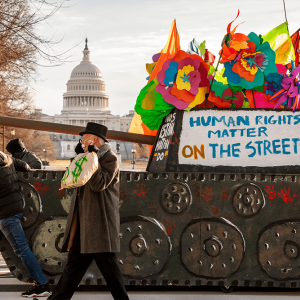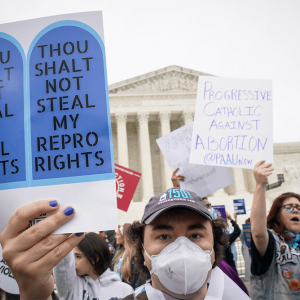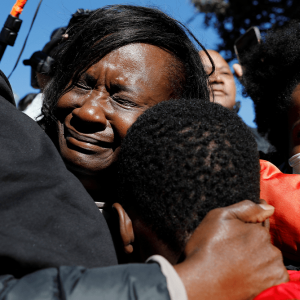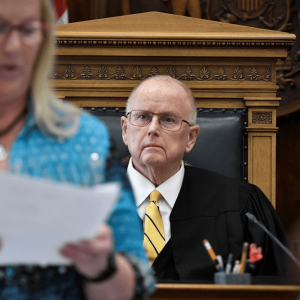
Mitchell Atencio is the senior associate news editor at Sojourners. He first served as a contract reporter for Sojourners in 2020.
Mitchell believes his role as a journalist is to ask compelling questions of the right people and to tell stories that impact the actions of readers. He loves writing stories of the radical or unique — especially within faith. Before joining Sojourners, Mitchell was a reporter in Kirkland, Wash. At Arizona State University he was a passionate and dedicated member of the award-winning, independent, student-newspaper The State Press. He also graduated with a degree in journalism and mass communications, but he doesn’t care as much about that part.
Although he didn’t stay long enough, Mitchell is proud to have been born in Atlanta and dreams of returning.
In journalism and elsewhere, Mitchell advocates for the physical medium. He is a vinyl record collector; a film photographer who shoots, develops, and scans his own film; a magazine subscriber; and a fan of writing letters on the family typewriter. In his spare time, he reads liberation theology, practices Zen, watches a lot of tennis, rants about the evils of pickleball, and makes coffee with a variety of methods. Mitchell is discalced out of religious commitment; he concedes it probably makes him a hippie.
Posts By This Author
Blood Donation Is Crucial to My Faith
In the summer of 2009, when I was 12 years old, a street racer crashed into my grandparents' minivan. The accident, by all means, should have killed my grandad, who was in a coma for several weeks after the crash. While undergoing emergency surgeries, he lost 98 units of blood in six hours — about the blood of 10 people. They were pumping blood into him as fast as it was coming out. Ever since that day, blood donation has held a place close to my heart.
Losing Isn’t Inevitable
This week has been one where loss seems as close as it might ever be — losses significantly more important than tennis matches. Thinking of politics as sports is deeply unhealthy but understanding and identifying when we are losing is important. Loss is never inevitable, but neither is victory.
What Would the End of Roe v. Wade Mean? Christian Leaders Respond
On the evening of May 2, Politico reported on a leaked draft of a Supreme Court decision in Dobbs v. Jackson which, if it became official, would overturn Roe v. Wade and end federal protections of abortion rights.
A May Day Reading List to Inspire Faith and Worker Justice

Eloy District, Pinal County, Arizona. Mexican irrigator on duty preparing field for flax cultivation. Via the U.S. National Archives Flickr.
Through the years, we’ve written about the ways churches can help workers — and the way workers can help the church.
A Short Ode to Twitter
Twitter is a strange thing — if it’s any singular thing at all. If it does come to an end, I hope we’ll look back reflectively and carefully, learning from what we got right, what we got wrong, and growing into the future.
Wipf and Stock To Pull ‘Bad and Boujee’ From Publication, Distribution
Wipf and Stock Publishers confirmed today that it has initiated the removal and ceased distribution of Jennifer M. Buck’s book, Bad and Boujee: Toward a Trap Feminist Theology, after days of criticism directed at the book.
Trading Apologetics for Humility
Proximity and humility are sometimes an answer for our beliefs.
This Spring, Let Truth Bloom
This spring, I’m thinking about the season as a blooming period for the complexities of truth. That’s not to say that truth itself is complicated, but that the application, acknowledgment, or apprehension of truth can be a sticky mess. Truth will set you free, but then we get to wrestle with freedom and the responsibility that comes with it: Realizing that racism is ingrained in the church is important, for instance, but acting to rid the church of that sin is paramount.
Grab Your Helmets, Let’s Do Some Myth Busting

Brad Stine performs. By Hope4ASU via Flickr.
When I was a kid, Christian comic Brad Stine yelled at me about wearing a helmet while riding my bike. He also yelled about seatbelt and car-seat laws, smoking laws, and gay marriage through his stand-up routine that I sat in the front row for.
Back When the World Was Grayscale
If we analyze our current conditions, avoid circular debates, stop waiting for heroes to save us, speak honestly about our past and present, and try to change today, we might just save tomorrow.
Christian Scholars Think We’re Spending Too Much on War

CODEPINK marches with the peace tank during the Deadline for Democracy protest at the U.S. Capitol on Dec. 6, 2021. For this event, a number of social justice organization in the Washington, D.C., area collaborated to shut down access to the Capitol as a means of pressuring Congress to act on key pieces of the Democratic agenda. (Photo by Allison Bailey/NurPhoto)
In the letter, the scholars criticize the budget being set $25 billion higher than President Joe Biden had requested. They write that the country urgently needs to “shift our security and foreign policy strategy” to break cycles of violence, cultivate peace, and practice constructive conflict.
What Does ‘Christian Nonviolence’ Actually Mean?
For most folks, Christian nonviolence evokes unified images of civil rights marches, Vietnam War resisters, and bumper stickers calling us to “turn the other cheek” or “beat swords into plowshares.” Yet Christian nonviolence isn’t a single school of thought, “but rather a rich conversation wrestling with what it means to live out the biblical call to justice amid the complexities of ever-changing political, social, and moral situations.”
The Perfect Soundtrack for MLK Weekend: What Our Editors Are Reading
One of the best jobs I ever held was assistant manager at Grace Records. I was a founding staff member at the new and used vinyl shop in Arizona, a father and son venture that was a thrill to work at.
Until the Year Wears Out: What Our Editors Are Reading
I’m not sure when it becomes too late to wish someone a happy new year. Some restrict the salutation to just the first three days, others extend it out to the first week, or even all of January. I tend to just wish a happy new year until the year wears out (a very fluid standard, I know).
After Investigation, Preemptive Love Founders ‘Will Not Be Returning’
Preemptive Love Coalition’s board of directors announced on Jan. 4 that the organization’s founders, Jeremy and Jessica Courtney, would not be returning to the organization in any capacity, after an investigation into the Courtneys’ leadership.
Former Staff Accuse Preemptive Love Founders of Abusive Leadership
Former employees at Preemptive Love Coalition, an international relief organization, have alleged that its leaders created an abusive environment. On Dec. 15, Ben Irwin, the organization’s former director of communications and public relations, wrote on Twitter and in subsequent posts to Medium, that Preemptive Love’s founders, Jeremy and Jessica Courtney, “abused, gaslit, threatened, and mistreated dozens of staff over the years.”
Web 3.0 and the Church
New internet technologies present new options—and questions—for Christians' work for justice.
IN 1995, Bob Sabath, then-administrator of Sojourners’ new website, wrote about how the World Wide Web might expand and change faith communities. “This next decade may show that the greatest social impact of the computer is not as an office automation tool, but as a communication tool, as a community-building tool.” Sabath, a founder of Sojourners and now director of web and digital technology, wrote that the web “could become a useful tool for helping us find each other and the resources we need to do the work we feel called to do.”
This was a prescient view on a technology that was only at its early stages. Of course, no one could predict exactly how monumentally transformative that technology would be. Sabath wrote during “Web 1.0,” also known as the “read-only” era. Web 1.0 essentially provided digital brochures (or, for churches, bulletins); it gave users a way to access and read information but minimal opportunities for interaction.
Web 2.0, or the “read-and-write” era, gave people a way to interact with others and generate their own content. Myspace, YouTube, Facebook, and Twitter all represent read-and-write usages, but do so with online forums and web applications. It’s the type of internet most people are familiar with, even if not by name.
The currently developing era of the internet is known as Web 3.0. While definitions vary, decentralization is often a key component of technologies that fall under Web 3.0. Blockchains are one of those technologies, and they enable cryptocurrencies (such as Bitcoin and Ether) and nonfungible tokens (NFTs)—the digital art that exploded in popularity over the last year.
All 3 Men Found Guilty in Murder of Ahmaud Arbery
A jury in Brunswick, Ga., found all three defendants guilty of murder Wednesday for chasing and killing Ahmaud Arbery while he was out on a run in February 2020. Faith leaders across the country showed gratitude for the verdict while noting the grief for Arbery’s family and the work of justice still to be done.
Nothing New Under the Sun: What Our Editors Are Reading
Even with the mass upheaval of our societal patterns and expectations brought by the pandemic, and the spread of global protests against racism and police brutality, our material conditions are not changing at the pace of our rhetoric.
‘God Is Weeping’: Faith Leaders React to Rittenhouse Verdict
Kyle Rittenhouse was found not guilty of homicide, attempted homicide, and reckless endangerment by a Wisconsin jury on Nov. 19, following a trial that lasted nearly two weeks.
Rittenhouse, then 17, shot and killed two people and injured a third in Kenosha, Wis., during August 2020 protests against police brutality and racism after a Kenosha police officer shot Jacob Blake in the back in the presence of three of his children, leaving him paralyzed from the waist down.
The defense team argued that Rittenhouse, now 18, traveled to the protests to provide medical aid and defend a used-car dealership from property damage; they argued that Rittenhouse only fired his weapon in self-defense.
“Kyle was a 17-year-old kid out there trying to help this community,” Mike Richards, Rittenhouse’s defense attorney, said in his closing statements.
The prosecuting attorney, Thomas Binger, told the jury, “This is a case in which a 17-year-old teenager killed two unarmed men and severely wounded a third person with an AR-15,” saying that Rittenhouse was not defending his home or family, and that Rittenhouse had stayed out past Kenosha’s citywide curfew.
Rittenhouse’s case elevated national conversations over self-defense, vigilantism, and gun access.
















